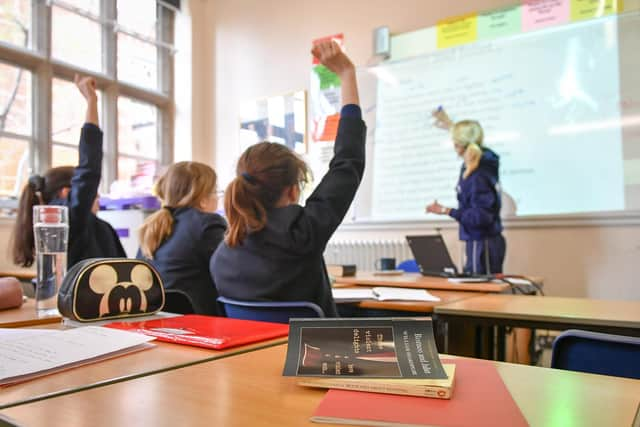Teachers to take next step towards Scottish strike action after overwhelming backing in consultative ballot
This article contains affiliate links. We may earn a small commission on items purchased through this article, but that does not affect our editorial judgement.
More than three quarters of Educational Institute of Scotland (EIS) members voted in a consultative ballot on strike action, with 94 per cent voting to reject the pay offer and 91 per cent saying they would be willing to strike.
The union said it would inform local authorities and the Scottish Government it intends to officially ballot on strike action at Wednesday’s meeting of the Scottish Negotiating Committee for Teachers (SNCT).
Advertisement
Hide AdAdvertisement
Hide AdThe Scottish Government said strike action would “not be in anyone’s interest” following the result of the consultative ballot.
If the formal ballot reaches similar levels of support and further pay negotiations fail, schools across Scotland will be faced with closure and significant disruption to learning.
It is the latest industrial dispute in Scotland after a summer of elongated battles over council waste worker pay, which saw rubbish pile up in Edinburgh and other cities last month.
John Swinney, the interim finance secretary, told MSPs he was already forced to find £700 million of savings in the Scottish budget.
It is not yet clear how a higher-than-expected pay deal for teachers would impact both local authority and Government budgets, but more cuts could be required.


Teachers negotiate their pay at the SNCT, which comprises representatives from the teacher’s side, council umbrella body Cosla, and the Scottish Government.
EIS general secretary Andrea Bradley said the current 5 per cent pay offer represented a 7 per cent real-terms pay cut, despite claims the offer was “generous”.
She called on Cosla and the Government to “fix” the situation to help teachers deal with the cost-of-living crisis.
Advertisement
Hide AdAdvertisement
Hide AdShe said: “This is an overwhelming ballot result, which demonstrates, very clearly, the collective view of Scotland’s teachers with regard to their pay – Cosla and the Scottish Government must do better.
"Teachers have simply had enough of the year-on-year struggle to achieve a fair pay settlement, with local authorities and the Scottish Government repeatedly dragging their feet and offering sub-inflation level pay settlements.
"Our members are acutely aware of the soaring cost of living and are feeling its damaging impact on themselves and their families. This is unacceptable. Now Cosla and the Scottish Government need to fix it.
"The message from today’s ballot result is very clear – we are not going to accept this pay proposal, and we are prepared to take strike action in pursuit of a fair pay settlement.”
EIS president Andrene Bamford said: “Our members have responded magnificently throughout our pay campaign so far. They have voted in huge numbers in the consultative ballot, and have made their feelings crystal clear.
"As we move ahead with the statutory ballot, we will need every member to step up again and vote for strike action.”
A Scottish Government spokesperson said: “We are committed to supporting a fair pay offer for teachers through the Scottish Negotiating Committee for Teachers, the body that negotiates teachers’ pay and conditions of service.
"Industrial action would not be in anyone’s interest, least of all learners and parents.”
Cosla declined to comment.
All episodes of the brand new limited series podcast, How to be an independent country: Scotland’s Choices, are out now.
It is available wherever you get your podcasts, including Apple Podcasts and Spotify.
Comments
Want to join the conversation? Please or to comment on this article.
